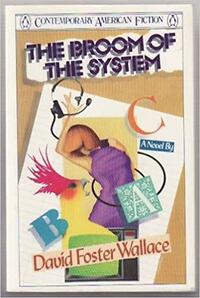You need to sign in or sign up before continuing.
Take a photo of a barcode or cover
funny
lighthearted
medium-paced
who likes books without endings? me, not so much. how about a book that ends in the middle of a sentence? oh, mr. foster wallace, how genius-y you are. you don't even need periods or independent clauses.
I want to rate some parts of this book a 1, and some parts a 5. I read the first 180 pages over a few months, and the remainder over 24 hours, which probably wasn't the best way to digest it. Some of the short stories contained with the book had me in stitches, while others had me wanting to throw the book against the wall. I think a second and third reading of this would see me giving it a higher rating.
Too overly wordy for me. Quit halfway through. Don't enjoy the constant changes to not know who is speaking or what the point even is.
Sometimes fun to read, sometimes a chore. Sentence structure and word use that made reading a pleasure, yet disjoint plot elements and flow that dragged one down. Still an interesting endeavor to take on. I can see where this as the author's first published novel hearkened toward the only other of his that I've read (Infinite Jest) as a hyper-lexical tour de force.
adventurous
funny
reflective
fast-paced
Plot or Character Driven:
A mix
Strong character development:
Yes
Loveable characters:
Yes
Diverse cast of characters:
Yes
Flaws of characters a main focus:
Yes
Obligatory “miss this guy” statement. Unbelievable freshman effort, imho, and better for me, Dan, than any of the Pynchon I’ve read that it supposedly rips off. Flashes of what would become Wallace’s signature style in later efforts abound, and I’m honestly blown away that he wrote this at 24. At the same time, it’s SO much some shit that an undergrad Phil student would write (particularly one at a small, Northeast liberal arts school), and I completely empathize with a Wittgenstein obsession — this feels like something I would have tried (and failed) to write as a post-traumatic relief effort from taking formal logic my junior year.
Amazing--but I feel that way about all DFW. Feels somewhat like a dress rehearsal for Infinite Jest.
Utterly brilliant and compelling, save for an ending which gets entirely too tangled up in itself, and then fails to resolve--and not in a fulfilling, all-is-open-ended-but-somehow-still-satisfactory manner. Still, worth reading for the brilliant dialogue, for the cleverness, and for the details. And because after this came Infinite Jest.
Overwritten, tedious, precocious. A flawed first novel--but therein can be found clues to his future success. DFW was no doubt embarrassed by TBOTS when compared to his future books. It's unnecessarily confusing, antic--like bad Pynchon. There is really nothing profound or consequential here. His best work lay ahead of him. Miss ya, Dave.
Goddamnit, DFW.
Reading this book, more than anything, brought on renewed lamentations for the untimely removal of this mind from this world. He saw life and meaning and relationships in a very special way-- one that speaks to me on some deeper emotiono-academic level and one that few other authors, try though they may, have managed to replicate. If you took my brain and multiplied its intelligence, its sardonically jovial wit, and its skill for conveying meaning by a tenthousandfold, I think the end result would be something like DFW's brain. That is, I think his smarts are quantitatively rather than qualitatively different from my own. Man was brilliant, period.
This is a masterful debut novel, stunning in its breadth and depth, ludicrous in its tone, and redeeming in its total non-commitment to being "satisfying" in the traditional literary sense. Most complaints I have ever read about Wallace's novels center on one facet: the plot goes nowhere, doesn't make sense, doesn't resolve itself, etcetera. Most complaints seem to come from minds that don't think like DFW's did, to which the reply is obvious: of course this story does not make sense to you; how could it? You do not see the world in the same lights and colours that Wallace did. You have no framework with which to make sense of his world. You don't even have the right organs to perceive it. It is not for you. It's not matter of judgment or worth or hierarchy-- it's just not something you're going to get much out of, like Murakami to my worldview.
That said, this book is absolutely for me. The characters are as multidimensional as Rick's dream Lenore, drawn from WDL's beer pen. They breathe. Even in their silence, famously relayed with a "..." amidst casual dialogue, they speak loudly and with a clarity beautifully juxtaposed against other characters' inability to really understand or connect with them. The central theme of context in this novel really cuts to the quick of why DFW's writing and characterization is so sharp: he builds fantastic context, scaffolding off the experiences and beliefs and views that he expects any reader who is going to read his work should have, limiting the number of words he needs to actually use to get you on the same page as him. There are no wasted words in DFW novels. He forces you to use the context that you yourself bring to the reading to unravel many of its finer points. When you imagine all these intricate people living inside his head, you really have to appreciate just how phenomenally complex a place his head must have been and how much skill it must have taken to relay to the reader only as much as needed to let the cogs slide into place on their own. He is the puppet master, the grandmother Lenore of his world, in more ways than one.
The seemingly linear and sensible plot (a woman's grandmother disappears from her nursing home at the same time that her bird starts talking and a connection is suspected, cue modern adventure mystery) masks a deep Wittgensteinian exploration of the nature of language, identity, function, fulfillment, and neurosis, and eventually the former is entirely derailed in favour of the latter. This, to me, is more compelling than a plot that sees itself point by point through to its conclusion.... if literature is not a used as a window into human psychology, then what is its purpose? A story to pass the time? Rick's stories explore this notion throughout, lending the book a profoundly recursive meta-quality that strengthens its impact. Wallace was so aware of the foolishness of what he was writing, what he was doing with his life, even fresh out of college at age 24. He just got it. Broom is a clear, concise, pointed (as compared to the lengthy tome that is Infinite Jest) illustration of that knowledge, that fundamental "getting" of "it".
I am sad that only one more DFW novel remains for me to digest. I am happy that I got to experience this one. If you're like me, you should not pass it up for a moment.
Reading this book, more than anything, brought on renewed lamentations for the untimely removal of this mind from this world. He saw life and meaning and relationships in a very special way-- one that speaks to me on some deeper emotiono-academic level and one that few other authors, try though they may, have managed to replicate. If you took my brain and multiplied its intelligence, its sardonically jovial wit, and its skill for conveying meaning by a tenthousandfold, I think the end result would be something like DFW's brain. That is, I think his smarts are quantitatively rather than qualitatively different from my own. Man was brilliant, period.
This is a masterful debut novel, stunning in its breadth and depth, ludicrous in its tone, and redeeming in its total non-commitment to being "satisfying" in the traditional literary sense. Most complaints I have ever read about Wallace's novels center on one facet: the plot goes nowhere, doesn't make sense, doesn't resolve itself, etcetera. Most complaints seem to come from minds that don't think like DFW's did, to which the reply is obvious: of course this story does not make sense to you; how could it? You do not see the world in the same lights and colours that Wallace did. You have no framework with which to make sense of his world. You don't even have the right organs to perceive it. It is not for you. It's not matter of judgment or worth or hierarchy-- it's just not something you're going to get much out of, like Murakami to my worldview.
That said, this book is absolutely for me. The characters are as multidimensional as Rick's dream Lenore, drawn from WDL's beer pen. They breathe. Even in their silence, famously relayed with a "..." amidst casual dialogue, they speak loudly and with a clarity beautifully juxtaposed against other characters' inability to really understand or connect with them. The central theme of context in this novel really cuts to the quick of why DFW's writing and characterization is so sharp: he builds fantastic context, scaffolding off the experiences and beliefs and views that he expects any reader who is going to read his work should have, limiting the number of words he needs to actually use to get you on the same page as him. There are no wasted words in DFW novels. He forces you to use the context that you yourself bring to the reading to unravel many of its finer points. When you imagine all these intricate people living inside his head, you really have to appreciate just how phenomenally complex a place his head must have been and how much skill it must have taken to relay to the reader only as much as needed to let the cogs slide into place on their own. He is the puppet master, the grandmother Lenore of his world, in more ways than one.
The seemingly linear and sensible plot (a woman's grandmother disappears from her nursing home at the same time that her bird starts talking and a connection is suspected, cue modern adventure mystery) masks a deep Wittgensteinian exploration of the nature of language, identity, function, fulfillment, and neurosis, and eventually the former is entirely derailed in favour of the latter. This, to me, is more compelling than a plot that sees itself point by point through to its conclusion.... if literature is not a used as a window into human psychology, then what is its purpose? A story to pass the time? Rick's stories explore this notion throughout, lending the book a profoundly recursive meta-quality that strengthens its impact. Wallace was so aware of the foolishness of what he was writing, what he was doing with his life, even fresh out of college at age 24. He just got it. Broom is a clear, concise, pointed (as compared to the lengthy tome that is Infinite Jest) illustration of that knowledge, that fundamental "getting" of "it".
I am sad that only one more DFW novel remains for me to digest. I am happy that I got to experience this one. If you're like me, you should not pass it up for a moment.






